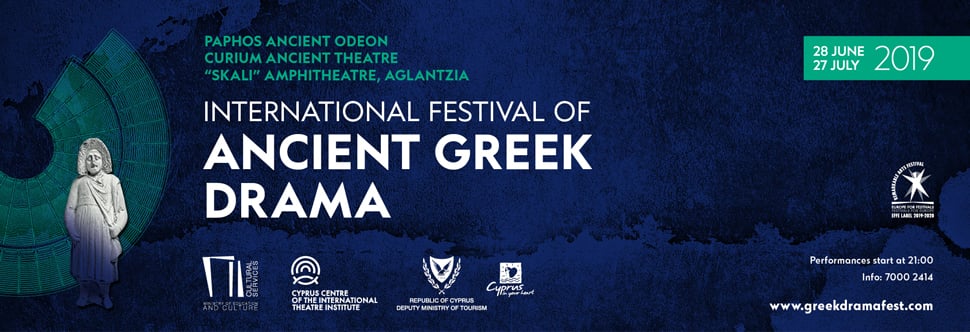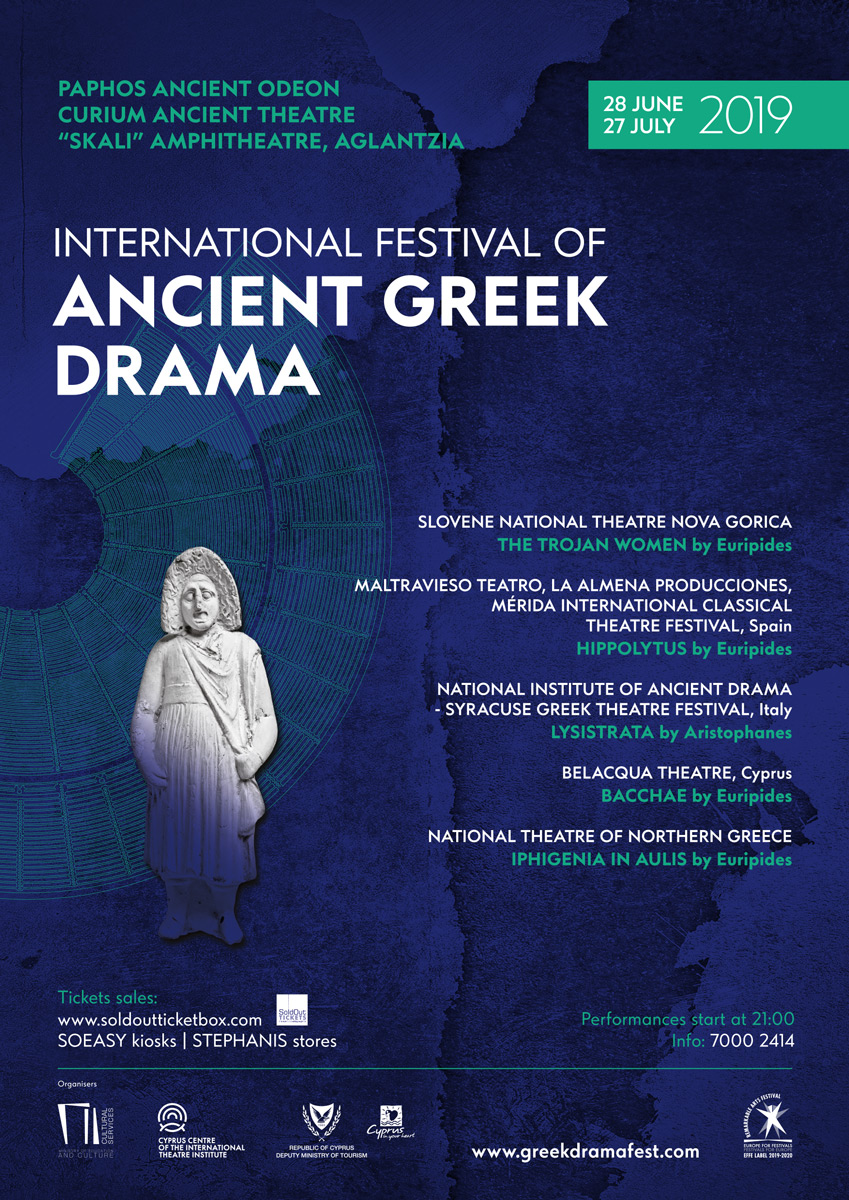
INTERNATIONAL FESTIVAL OF ANCIENT GREEK DRAMA 2019
Где: ПАФОС, НИКОСИЯ, ЛИМАССОЛ
Когда: 28/06/2019 - 28/07/2019
Билеты: €12 │€6 reduced (Students, Senior Citizens, National Guard, Unemployed) │€45 Festival pass (per person for 5 performances)
О мероприятии:
Five productions of ancient Greek drama by distinguished theatre companies from Cyprus, Greece, Italy, Slovenia and Spain participate at the twenty-third edition of the “International Festival of Ancient Greek Drama”, presenting performances at Ancient Odeon in Paphos, Curium Ancient Theatre in Limassol and “Skali” Amphitheatre in Aglantzia, Nicosia.
Дополнительная информация о мероприятии:
▪ Performances start at 21:00
▪ Please arrive at the theatre before 20:40*
*Spectators attending performances at the Curium Ancient Theatre are advised to arrive at least 45 minutes before the performance (please see the important notes at the end of the page)
►Ticket prices:
€12 regular
€6 reduced (Students, Senior Citizens, National Guard, Unemployed)
€45 Festival pass (per person for attending all five performances)
€10 group sales (over 10 persons per performance) at [email protected]
▪ Info: www.greekdramafest.com
-------------------------------------------------
SLOVENE NATIONAL THEATRE NOVA GORICA
THE TROJAN WOMEN by Euripides
▪ Friday, June 28│Paphos Ancient Odeon
▪ Sunday, June 30│“Skali” Amphitheatre, Aglantzia
The Slovene National Theatre Nova Gorica presents the first Slovenian production of Euripides’ tragedy The Trojan Women, the opening production of this year’s Festival.
The universally timeless anti-war tragedy, with the exceptional direction of Jaša Koceli and Marjuta Slamič in the role of Hecuba, gathered rave reviews from the Slovenian press and audience, giving Marjuta Slamič the Tantadruj award as a distinction for her performance (season 2017/2018).
The Trojan War is over; the Trojan heroes have fallen; the royal family is decimated; the once glorious city is looted. In a landscape of desolation, under the ruined walls, Hecuba – the mother, the woman, the queen- together with the women of Troy, all captives of the Achaeans, lament over their tribulations and their fate to be led as slaves in the homes of the victors.
In Trojan Women, Euripides expresses a relentless "blame" for the atrocities of war, condemning the ferocity of man and praises his ability to endure.
▪ With Greek and English surtitles
Translation: Jera Ivanc
Direction: Jaša Koceli
Dramaturg: Ana Kržišnik Blažica
Language Consultant: Srečko Fišer
Set design: Darjan Mihajlović Cerar
Costume design: Branka Pavlič
Composer: Miha Peric
Repetiteur: Marta Kosturska
Choreography: Tajda Podobnik
Photography: Mankica Kranjec
Lighting design: Samo Oblokar
Make-up design: Tina Prpar
Cast:
Poseidon: Kristijan Guček
Athena: Helena Peršuh
Hecuba: Marjuta Slamič
Cassandra: Raiven
Andromache: Patrizia Jurinčič Finžgar
Helen: Arna Hadžialjević
Talthybius: Jure Kopušar
Menelaus: Miha Nemec
Astyanax: Lev Lipušček
Warrior: Siniša Bukinac
Chorus Leader of Trojan captives: Ana Facchini
Chorus: Medea Novak, Vida Fabčič, Hana Ferizović, Kati Harej, Petra Kolenc, Ajda Podgornik Valič, Helena Simčič, Barbara Simčič Veličkov, Anja Trobec, Lucija Zorn, Ana Žnidarčič
Poet: Farah Chamma
-------------------------------------------------
MALTRAVIESO TEATRO, LA ALMENA PRODUCCIONES,
MÉRIDA INTERNATIONAL CLASSICAL THEATRE FESTIVAL, Spain
HIPPOLYTUS by Euripides
▪ Monday, July 8│Paphos Ancient Odeon
▪ Wednesday, July 10│“Skali” Amphitheatre, Aglantzia
Maltravieso Teatro and La Almena Producciones, in collaboration with the Mérida International Classical Theatre Festival, present Euripides’ Hippolytus directed by Emilio del Valle.
In Hippolytus, a tragedy with philosophical, religious and existential quests, Euripides sets up a masterful trap, escalating into the tragic, where the Gods play a key role, leading humans in a disastrous conspiracy of silence, in inevitable error, in punishment but also in forgiveness.
The Spanish production, which was presented last summer at the 64th Mérida Festival and received great praise, attempts to recompose the first tragedy written by Euripides, Hippolytus Veiled, based on the surviving Hippolytus Garland-Bearer.
With Phaedra and her stepson Hippolytus, as the two main characters, Euripides weaves up a tragedy that presents the dilemmas between passion and logic, lawless love, oestrus and its tragic consequences.
▪ With Greek and English surtitles
*The performance is suitable for spectators over 16 years old
Adaptation/Dramaturgy: Isidro Timón, Emilio del Valle
Direction: Emilio del Valle
Set design: Isidro Timón, Emilio del Valle
Costume design: María de Melo
Music: Álvaro Rodríguez Barroso
Lighting design: José Manuel Guerra
Sound design: Jorge Muñoz
Hair and Make-up design: Carlos Tello
Director’s assistants: Jorge Muñoz, Gustavo del Río
Production Managers: Isidro Timón, Luis S. Molina
Technical Direction: La Almena Producciones, Maltravieso Teatro
Production Team: Clara Barquilla, Ana Mos, Jesús Pablos Castañeda, Esther Sáenz
Cast:
Hippolytus: Juan Díaz
Phaedra: Camila Almeda
Theseus: José A. Lucia
Nurse: Cristina Gallego
Artemis: Amelia David
Aphrodite: Mamen Godoy
Messenger/Hunter: Rubén Lanchazo
Assistant of Theseus/Hunter: Javier Uriarte
Women of Troezen: Estefanía Ramírez, Raquel Bravo, Guadalupe Fernández, Sara Jiménez
Musician on stage: Fernanda Valdés
Trombone: Javier Uriarte
Violin: Estefanía Ramírez
-------------------------------------------------
NATIONAL INSTITUTE OF ANCIENT DRAMA - SYRACUSE GREEK THEATRE FESTIVAL, Italy
LYSISTRATA by Aristophanes
▪ Friday, July 12│Curium Ancient Theatre
▪ Saturday, July 13│Curium Ancient Theatre
The distinguished Tullio Solenghi directs the most renowned comedy of Aristophanes, Lysistrata, produced by the National Institute of Ancient Drama (Fondazione INDA) of the Syracuse Greek Theatre Festival, featuring the awarded Elisabetta Pozzi as Lysistrata in a production of superb cast and collaborators.
As the Peloponnesian War rages, keeping the men away from their homes, Lysistrata convinces the women of Athens, Sparta and other cities to take matters into their own hands. During the women’s assembly, Lysistrata suggests that they abstain from their marital duties, in the form of a sex strike, until a peace treaty is signed from both war fronts. Even though there are some initial reactions, the women are finally convinced by Lysistrata and the Spartan Lampito and come together in devising their plan. Their action has immediate results and the men’s reactions are many and varied. After setbacks, conflicts and negotiations, peace is finally achieved.
▪ With Greek and English surtitles
Translation: Giulio Guidorizzi
Direction: Tullio Solenghi
Set/Costume design: Andrea Viotti
Choreography: Paola Maffioletti
Lighting design: Pietro Sperduti
Director’s assistant/Music instruction: Marcello Cutugno
Director’s assistant: Martina Garciulo
Cast:
Lysistrata: Elisabetta Pozzi
Cleonice: Federica Carrubba Toscano
Myrrhine: Giovanna Di Rauso
Lampito: Viola Marietti
Chorus of Old Men: Vittorio Viviani (Draces), Totò Onnis (Strymodorus), Mimmo Mancini (Philurgus)
Chorus of Old Women: Simonetta Cartia (Nicodice), Silvia Salvatori (Calyce), Tiziana Schivarelli (Critylla), Elisabetta Neri (Boeotian Woman)
Magistrate: Federico Vanni
Three Women: Margherita Carducci, Elisabetta Neri, Federica Carruba Toscano
Cinesias: Tullio Solenghi
Athenian Negotiator (Prytanes): Roberto Alinghieri
Spartan Herald: Giuliano Chiarello
Spartan Ambassador, Athenian Ambassadors: Riccardo Livermore, Francesco Mirabella
Reconciliation: Elisabetta Neri
Chorus leader: Simonetta Cartia
Chorus: Giulia Antille, Beatrice Barone, Emanuele Carlino, William Caruso, Adele Di Bella, Tommaso Garrè, Federica Gurrieri, Irene Jona, Gabriele Manfredi, Giulia Messina, Silvia Messina, Federico Mosca, Roberto Mulia, Salvatore Pappalardo, Stefano Pavone, Gabriele Rametta, Isabella Sciortino, Alba Sofia Vella, Salvatore Ventura, Gabriella Zito
-------------------------------------------------
BELACQUA THEATRE, Cyprus
BACCHAE by Euripides
▪ Thursday, July 18 │“Skali” Amphitheatre, Aglantzia
▪ Saturday, July 20 │Curium Ancient Theatre
▪ Monday, July 22 │Paphos Ancient Odeon
The internationally award-winning Izumi Ashizawa collaborates with Cypriot theatre company Belacqua Theatre and directs Euripides’ Bacchae, combining the techniques of Japanese Noh theatre and ancient Greek drama.
In Bacchae, Euripides recounts the advent of Dionysus to Thebes in order to impose his worship, the bacchanalian cult. King Pentheus refuses to accept it, and Dionysus gets his revenge. He infuses frenzy to the women of Thebes and Pentheus finds a horrid death by his own mother, Agave.
The intercultural production aims to create a new performance language, juxtaposing the worlds of East and West, Male and Female, Instinct and Reason, while presenting Dionysus as an “idea”, a concept rather than dialectic, provocative and elusive. Japanese-inspired acting techniques and aesthetics are utilised in an attempt to represent Dionysus and Bacchae, as the “Other”, through the collision of the native and the newcomer, the resident and the stranger.
▪ With English surtitles
*The performance is suitable for spectators over 16 years old
Translation: Yorgos Chimonas
Direction/Movement direction: Izumi Ashizawa
Set/Costume design: Elena Katsouri, Thelma Cassoulidou
Original Music: Ermis Michael
Lighting design: Vasilis Petinaris
Trailer Creation: Sock Team
Production/Communication: Stephanie Polykarpou
Cast:
Pentheus: Giorgos Kyriakou
Chorus of Bacchae women/ Dionysus/ Cadmus/ Tiresias/ First Messenger/ Second Messenger/ Agave:
Nayia Anastasiadou, Νiki Dragoumi, Ioanna Kordatou, Themida Nikolaou, Loukia Pieridou, Maria Filippou
-------------------------------------------------
NATIONAL THEATRE OF NORTHERN GREECE
IPHIGENIA IN AULIS by Euripides
▪ Friday, July 26 │Curium Ancient Theatre
▪ Saturday, July 27 │Curium Ancient Theatre
Yannis Kalavrianos directs NTNG’s summer production, Iphigenia in Aulis by Euripides, in a new translation by Pantelis Boukalas and with Anthi Efstratiadou, the 2016 recipient of the Melina Mercouri theatre award, in the role of Iphigenia.
The Greek fleet ready to sail to Troy, remains stuck in Aulis as the wind has lulled. In order for the wind to blow, it is imperative to sacrifice Iphigenia, the daughter of the commander of the Achaeans, Agamemnon. Faced with a horrific dilemma, torn between his daughter and his people, Agamemnon nevertheless decides to proceed to the sacrifice, dismissing the pleas of his wife Clytemnestra, Iphigenia, Achilles, even his own brother, Menelaus. Iphigenia ultimately reconciles with her tragic fate and accepts her heroic death for her country’s sake. In Iphigenia in Aulis, the tension between the public and the private, the male and the female, the polis and the family, generates characters who do not hesitate to cross the line.
▪ With English surtitles
Translation: Pantelis Mpoukalas
Direction: Yannis Kalavrianos
Set/Costume Design: Alexandra Boussoulenga, Rania Yfantidou
Music: Thodoris Ekonomou
Choreography/Movement: Dimitris Sotiriou
Lighting design: Nikos Vlassopoulos
Music Instruction: Panagiotis Barlas
Director’s Assistant: Alexia Mpeziki
Second Director’s Assistant: Charis Pehlivanidis
Set/Costume Designers’ Assistants: Elina Eftaxia, Isabela Tudorache
Production Coordination: Marleen Verschuuren, Maria Lazaridou
Cast:
Agamemnon: Giorgos Glastras
Old Man: Giorgos Kafkas
Menelaus: Nikolas Maragopoulos
Messenger: Christos Stylianou
Clytemnestra: Maria Tsima
Iphigenia: Anthi Efstratiadou
Achilles: Thanasis Raftopoulos
Chorus: Momo Vlachou, Stellina Vogiatzi, Despina Gianopoulou, Ioanna Demertzidou, Danai Epithymiadi, Aigli Katsiki, Lida Koutsodaskalou, Maria Konstanta, Alexia Mpeziki, Zoi Mylona, Marianthi Pantelopoulou, Katerina Papadaki, Rebecca Tsiligaridou
------------------------------------------------------
IMPORTANT NOTES FOR THE AUDIENCE
► Notes for attending performances at the Curium Ancient Theatre:
Spectators are advised to arrive at least 45 minutes before the performance. Once the available parking spaces at the archaeological site are filled, the entrance of other private cars is prohibited. The rest of the private cars shall be parked in Agios Ermogenis and spectators will be transported to the theatre by buses. The last bus route from Agios Ermogenis’ parking place to the theatre departs at 20:45. After the last bus route, spectators will have to walk from Agios Ermogenis towards the theatre, in order to attend the performance.
► Notes for attending performances at the Paphos Ancient Odeon:
The entrance to the Ancient Odeon, is located on Galatiani Street, from the roundabout of Kings Avenue Mall towards the port of Kato Paphos (Ap. Pavlou Avenue).
► To facilitate the public in Nicosia, shuttle transport from Nicosia to Curium Ancient Theatre will be provided, for the following performances:
Lysistrata by Aristophanes (produced by Fondazione INDA, Italy) on July 12 and 13
Iphigenia in Aulis by Euripides (produced by NTNG) on July 26 and 27
▪ Departure: 18:30 (from the parking opposite the Handicraft Centre in Athalassa Avenue)
▪ Bus ticket cost: €2 (two Euros)
Ιt is necessary to purchase your bus ticket along with the performance ticket, 15 days prior, due to a fixed number of buses.
►Please note that the following are not permitted:
▪ Entry into the theatre after the performance commences.
▪ Smoking and the consumption of food and/or drinks (with the exception of water).
▪ The use of mobile phones during the performance.
▪ Taking photographs, with or without flash, and/or filming part and/or whole of the performance.












